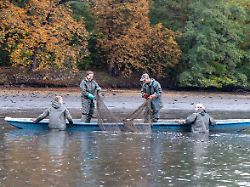Prices increased significantly
Consumers are buying less fish
November 1, 2023, 6:21 p.m
Listen to article
This audio version was artificially generated. More info | Send feedback
Fish and seafood were left at retailers more often in the first nine months of the current year than a year ago. It is true that the Germans spent more on these goods. But the increase is probably solely due to price increases.
German consumers have spent more on fish since the beginning of the year. At the same time, however, the quantity sold fell. In total, fish and seafood worth 3.7 billion euros were sold over counters and cash registers in the food retail sector in the first nine months, according to the Fish Information Center (FIZ) in Hamburg. That was an increase of 4.3 percent. However, the quantity purchased shrank by 5.5 percent compared to the previous year. Mathematically, this results in a total sales volume of around 305,000 tons.
According to the information, an average of 12.13 euros was spent on one kilogram of fish product between January and September, 10.3 percent more than a year ago. According to the FIZ, the reduced purchasing quantities apply to all product groups. Accordingly, significantly fewer purchases were made of canned fish (minus 9.1 percent), smoked fish (minus 8.8 percent) and fresh fish (minus 7.1 percent).
When the FIZ presented its half-year figures in the summer, there was little hope of falling prices. International logistics costs no longer rose as much, but personnel costs rose due to the shortage of skilled workers, it was said. In addition, most fish is traded in dollars and the weakness of the euro alone accounted for a quarter of the price increases in 2022. The marketing organization of the German fishing industry did not comment on individual fish species.
Meanwhile, the environmental organization WWF criticized the fact that the crab fishery on the German, Dutch and Danish North Sea coasts had again received the MSC label, which is intended to certify sustainable fishing. “This is met with criticism from the WWF because the crab fishery on its current scale is not compatible with the protection of the Wadden Sea national parks and it generates too much bycatch of juvenile fish and invertebrates.” It affects the credibility of the MSC that its certifications are not subject to higher standards when fishing takes place in marine protected areas. “Of course, crab fishing belongs to the North Sea, but it can and must be carried out in a more environmentally friendly manner and not everywhere,” said WWF Wadden Sea expert Hans-Ulrich Rösner.
